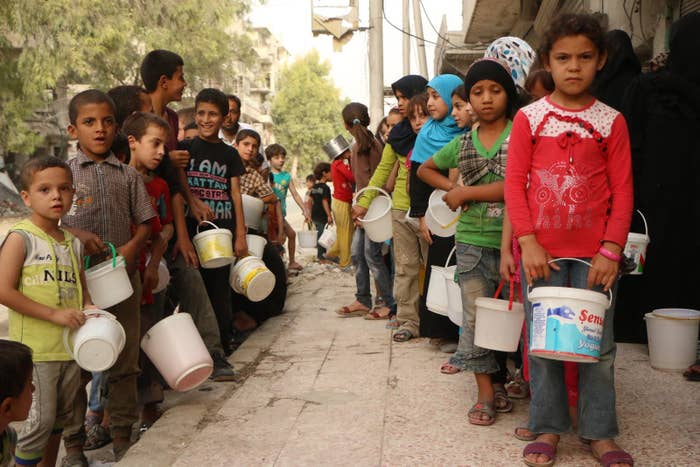
Recent news headlines around the world have focused on the flood of desperate Syrian refugees scrambling for sanctuary in Europe, drowning in boats in the Mediterranean, and suffering in camps in neighboring countries. But activists hope the global attention currently flowing to the Syrian crisis also leads to a focus on something else: those still in Syria.
"This is about Syria. It's not just a European refugee crisis," Daniel Wordsworth, president and CEO of the American Refugee Committee (ARC), told BuzzFeed News. "I think about it like a humanitarian earthquake that's happening inside of Syria and it then moves at a much slower speed, reverberating throughout the country, then the region, and now the shores of Europe.
"We certainly hope that this concern that people are feeling will translate into a concern for the people still inside of Syria," he said.
After more than four years of combat, the U.N. last estimated about 200,000 people had been killed in the fighting between President Bashar al Assad's forces and rebel fighters -- not to mention extremist groups like ISIS that also emerged from the chaos.
While some 4.08 million people have fled the country, more than 7.6 million people remain internally displaced inside Syria, according to the UNHCR, meaning their homes have been destroyed.
At a global conference in March, international donors pledged almost $4 billion in humanitarian assistance to Syria, but the U.N. says its Syria Refugee and Resilience Program only has 37% of the funding it requires.
The global body says recent worsening conditions inside Syria are directly to blame for the exodus of refugees.
"Inside Syria, the last few months have been brutal," UNHCR spokeswoman Melissa Fleming told reporters in Geneva on Tuesday.
Fleming said fighting had increased across the country, with rocket and mortar attacks in Damascus, and a rising number of car bombs in other cities.

Unemployment is soaring, inflation is high, and many people live in extreme poverty, according to the U.N.
Both sides of the conflict are also cutting off water and electricity supplies as a "tool of warfare," according to the Red Cross.
Additionally, the country's health and education systems are in tatters, according to Wordsworth. People who have been forced to flee their homes, and don't have loved ones to take them in, will often shelter inside abandoned schools, the ARC president said, with his workers helping to convert the classrooms into apartments with utilities and sanitation facilities.
Wordsworth said those still in Syria may be unable to afford passage out of the country, or may be unwilling to risk the dangerous journey. But, he said, they also may not wish to leave.
"Contrary to what a lot of people think, Syrians love Syria. They love their neighborhoods, their families, and their friends. They don't want to leave. They want to fight to the bitter end to keep their place," he said. "Humans are shockingly resilient fighters, so I think they're fighting to keep their place on this earth."
Peter Salama, the UNICEF regional director for the Middle East and North Africa, told BuzzFeed News it is important to remember those left behind.
"The first point to make about any story regarding the refugee crisis is that we have to address the crisis at its source, which is the intrepid conflict in Syria," he said. "We need to do much more in terms of humanitarian aid inside the country still. And we need a political solution to the crisis."
Oxfam America also said it hopes the recent uptick in news coverage gives the Obama administration an impetus to revive failed efforts to reach a political solution to the war.
"It’s been heartening to see the outpouring of support for Syrians who are fleeing the conflict over the past couple of weeks," Vanessa Parra, an Oxfam spokeswoman, told BuzzFeed News. "We’re hopeful that people will be equally moved by the stories of Syrians who are still in Syria.
Tamerra Griffin contributed to this report.
